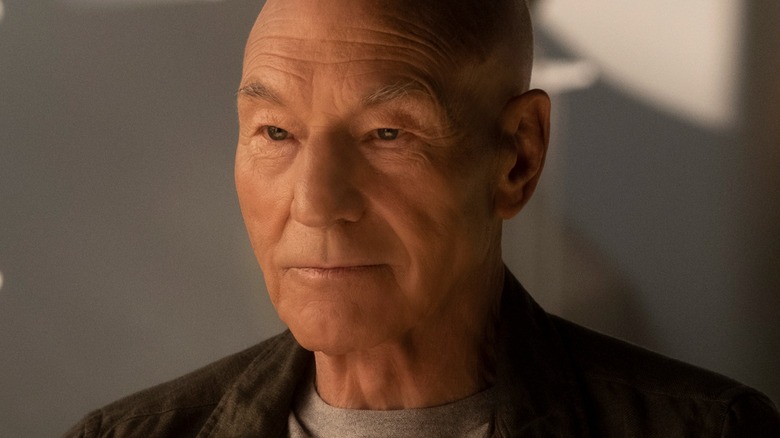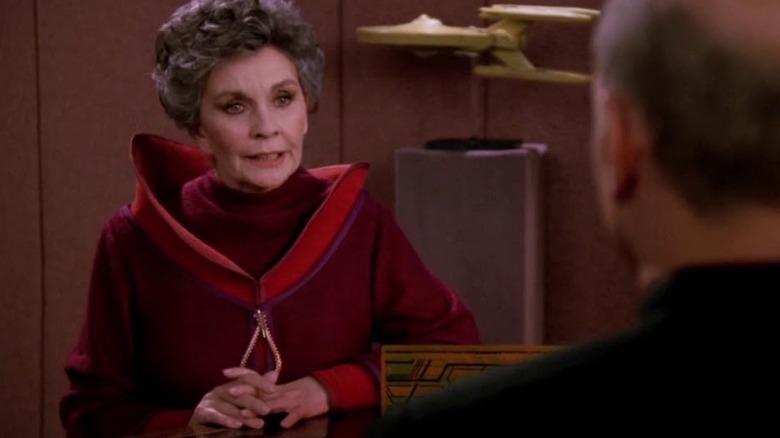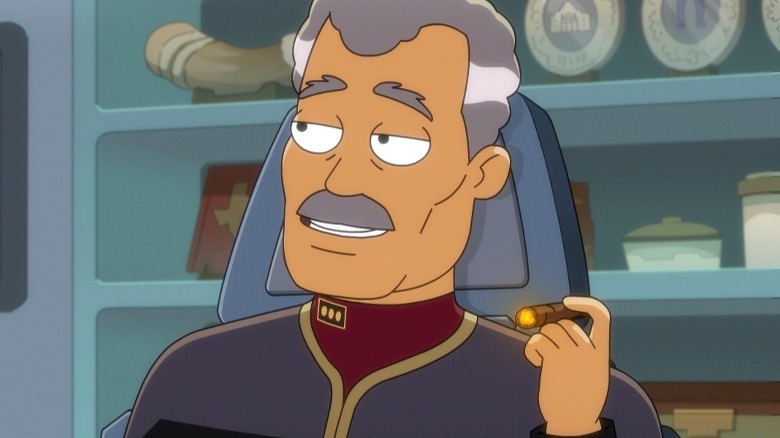Star Trek: The Star Fleet Admiral Problem That The Shows Rarely Address
Starfleet has its fair share of heroes — but unfortunately, many admirals don't fall in that category. Achieving a high rank in the Federation might be a major reward but the price of having such a powerful role has corrupted more than one leader. Viewers have long argued about these leaders and their various levels of failure. With the popularity of "Star Trek: Picard" seemingly reinvigorating the franchise, it only makes sense that the analysis is growing once again. Notable among the questions are why the admirals are bad, the motivations behind the decision, and even which ranks as the worst ever. The opinions open up a theory that has long followed the franchise over various series.
One of the many complex conversations encapsulated feelings towards the higher-ranking officials, zeroing in on the period portrayed during "Star Trek: The Next Generation." U/HipHopAnonymous23 found them to be there only to bother crew members — especially captains. They specifically focused on their treatment of Picard and noticed constant questioning of his choices after loyally serving the Federation. "Why don't they get the picture? You'd think someone who was able to obtain such a high rank would be capable of some rational thought every once in a while," the user wrote.
Next Generation and DS9 featured memorable (and bad) admirals
The resurgence of "Star Trek" TV started with "Star Trek: The Next Generation" and continued with "Deep Space Nine" While fans may have been entranced by the world presented by the series, the episodes exposed viewers to serious topics — including the darker side of power. Of these officials, some stand out above others.
It's hard to overlook "The Drumhead" when bringing up questionable admirals. A dilithium chamber explosion leads to accusations of sabotage. In response, a retired admiral — Norah Satie (Jean Simmons) heads up an investigation on the Enterprise. The crew discovers it was not a deliberate act, but Satie refuses to stop her pursuit. Her eventual questioning of even Picard (Patrick Stewart) himself leads to a tribunal; his dramatic comparison to specific court-martials centuries before relates to the episode's title. The entire storyline exposes a fear, hatred, and paranoia that continues to be relevant in today's society. Seeing her confronted with the words of her father provides a powerful rebuttal to such loathsome qualities and shows how important it is to stop them.
The series "Deep Space Nine" offered Admiral Ross (Barry Jenner), whose motives, as well as opinions on his character, have led to healthy debates among fans. "Hats off to Admiral Ross for not being a typical Starfleet Badmiral," wrote u/Stardestroyer001. Their comment didn't go unchallenged, though as the debate around Ross continues. Well...he DID clandestinely work with Section 31 to advance the federations interests in the war no matter the cost to their ally/adversary," u/Treksaves commented. "Maybe that's kind of his job, but it helped show that even Ross had a dark side."
Lower Decks offered an interesting theory for bad behavior
The "Star Trek" franchise crossed over into adult animation with the series "Star Trek: Lower Decks." It follows crew members of the ship Cerritos and gives them an active voice. In many live-action series, these characters would have been relegated to the background or completely unseen in many cases. Tackling overlooked details also gave the series a chance to reflect on why admirals often turn bad. In one episode, a character talks about reaching the coveted level and demystifies its importance. According to them, the lack of a reason to push forward sends seemingly ethical leaders on the wrong path.
This theory sounds valid according to some viewers and fans. U/Royal-Mathematician2 reflected on it, offering an even more simple explanation — boredom. "Earth seems pretty dull. People just sit around all day replicating everything not doing much," they wrote. In their opinion, the only way to have an adventure, as well as something enjoyable, is to join Starfleet. That last aspect was put to the test by u/WoundedSacrifice, who argued "Star Trek: Picard" showed there are ways to leave Earth that don't involve Starfleet command.
It doesn't hurt that the series itself has explored the idea of admirals gone bad. The Season 3 finale featured Vice Admiral Buenamigo (Carlos Alazraqui) coming to terms with his own decisions; an idea of AI in place of the Starfleet crew may have seemed like a good idea to Buenamigo but it soon proved to be a deadly decision. Much like Picard and Admiral Satie, the choice of efficiency over actual crew experience and empathy touches on higher-ranking officials seemingly demeaning or overlooking the contributions of lower-ranked Starfleet members.


